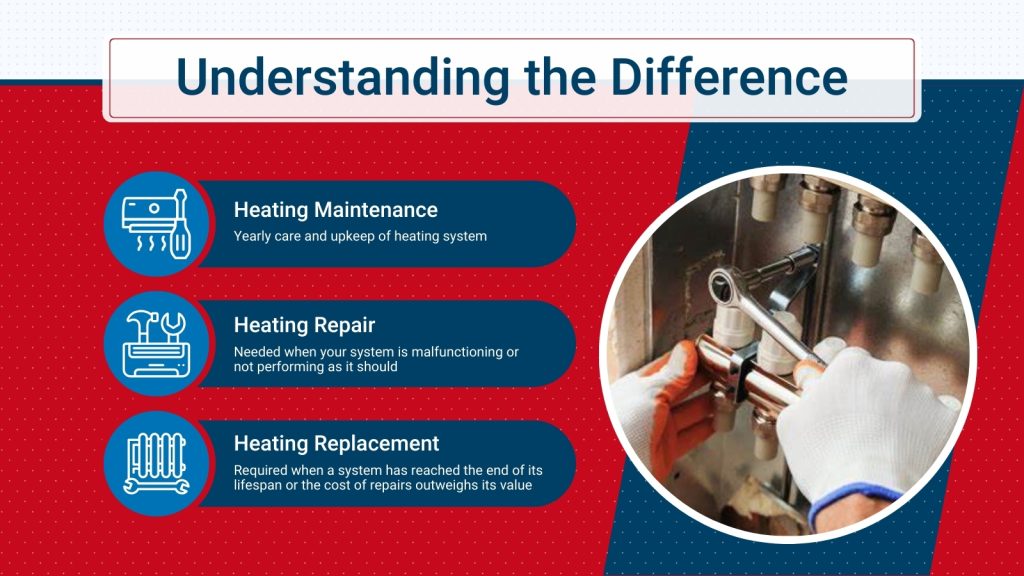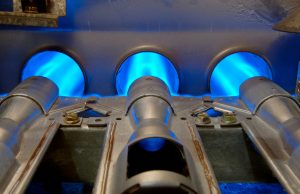Ensuring that your heating system is in top condition is essential for home comfort here in Houston. Regular maintenance is key to keeping your hvac system, including your furnace, in both tip top shape and good shape. Preventative maintenance is a proactive approach that helps you avoid unexpected breakdowns and extends the life of your system. It’s also important to remember that regular maintenance should cover both your heating and cooling system to ensure year-round comfort and efficiency. However, when it comes to addressing issues with your heating system, homeowners often find themselves confused between the terms heating repair, heating replacement, and heating tune-up in Houston, TX.
A heating tune-up, or furnace tune up, is a recommended regular service that involves a thorough inspection and a complete checklist of tasks performed by professional technicians. These experts focus on maintaining your furnace by inspecting, cleaning, and adjusting components to ensure optimal performance. A complete inspection includes checking the thermostat and ignition system. This process helps ensure your furnace is ready for the season and keeps your furnace running efficiently, reducing the risk of breakdowns and prolonging its lifespan.
Knowing the difference between these services can save you money and prevent future breakdowns. Regular maintenance benefits both the heating and cooling system, ensuring reliable performance year-round. Just as you schedule routine health check-ups, annual tune ups and inspections are essential for the health of your heating system. Ongoing maintenance is important for maintaining your furnace’s longevity and efficiency, helping your system stay efficient season long.
Here’s a breakdown of what each service involves, along with tips on how to tell which one you need this year. Additionally, ongoing training for technicians and preparedness for unexpected events further ensures reliable performance throughout the winter. A well-maintained cooling system is just as important for comfort during Houston’s hot months, so maintaining both systems is essential.

Introduction to Heating Systems
A reliable heating system is the heart of home comfort during the winter months, especially for Houston homeowners who want to stay warm when the temperatures drop. Whether you have a furnace, heat pump, boiler, or radiant floor heating, understanding how your heating system works, and why regular maintenance matters, can make a big difference in your comfort, energy bills, and peace of mind.
Heating systems are designed to circulate warm air throughout your home, keeping every room cozy no matter the weather outside. The most common type is the furnace, which uses either gas or electricity to heat air before distributing it through vents. Other systems, like heat pumps and boilers, offer different methods of warming your space, but all require regular attention to perform efficiently and reliably.
Scheduling a heating system tune up, also known as a furnace tune up, is one of the best ways to keep your entire system in tip top shape. During a tune up, a professional service technician will thoroughly inspect your furnace, burners, vents, and electrical connections. They’ll clean and adjust key components, check gas pressure, and ensure the heat exchanger and flame sensor are working at maximum efficiency. A complete furnace tune-up typically includes a 21-point inspection. This attention to detail helps your heating system run efficiently, reduces the risk of costly repairs, and can even extend the life of your unit.
Regular maintenance isn’t just about preventing breakdowns, it’s about saving money and ensuring your family stays warm all winter long. A well-maintained heating system uses less energy, which means lower energy bills and fewer surprises when the weather turns cold. Plus, catching small issues early can prevent them from turning into major, expensive repairs down the road. Furnace tune-ups typically last about an hour, depending on the system configuration.
For Houston homeowners, where winters can be unpredictable, making heating system maintenance a priority is essential. By scheduling annual tune ups and routine inspections, including an annual inspection, you can ensure your heating and cooling system is ready to perform reliably, keeping your home comfortable and your mind at ease season after season.
Understanding the basics of your heating system and the importance of regular maintenance is the first step toward a healthier, more efficient home. In the next section, we’ll dive deeper into the benefits of routine heating system maintenance and how it impacts the overall performance and longevity of your system.
Heating Maintenance: What It Includes and Why It Matters
Heating maintenance refers to the routine care and upkeep of your heating system, such as your heater or furnace. It involves scheduled inspections and tune-ups designed to keep your system running efficiently. HVAC professionals will typically check your system for wear and tear, clean parts, lubricate moving components, and ensure that everything is running smoothly. The job performed by technicians during maintenance is crucial, they must complete each task correctly and thoroughly to ensure optimal performance and safety. For a deeper look into the process, check out what happens during heating maintenance and how it protects your system long-term.
Routine maintenance helps prevent sudden breakdowns and extends the life of your system by catching small issues before they escalate into major problems. Regular maintenance is a necessity for ensuring your heater or heating system remains reliable and keeps your home comfortable, especially during colder months. Technicians follow a maintenance checklist during a heating maintenance visit to ensure every important step is covered. Some tasks that are often included in a heating maintenance visit include:
- Cleaning air filters and vents
- Checking thermostat calibration
- Inspecting electrical connections
- Testing system efficiency
- Lubricating motor and blower components
- Inspecting and changing filters as part of furnace maintenance
When do you need heating maintenance?
- If you’re wondering whether annual checkups are worth it, consider how much you can save with regular heating system maintenance.
- Even if your system seems to be working fine, yearly maintenance is essential to prevent future malfunctions.
- Maintenance is often required by manufacturers to keep your warranty valid.
Furnace Tune Ups: What They Are and Why They’re Essential
A furnace tune up is one of the most important preventative maintenance services you can schedule for your heating system. Designed to keep your heating and cooling system operating smoothly and reliably, a furnace tune up is a proactive way to ensure your entire system is ready for whatever the weather brings. By investing in regular furnace maintenance, you’re not only protecting your comfort but also maximizing the efficiency and lifespan of your furnace.
During a furnace tune up, a professional service technician will perform a detailed inspection of your entire system. This includes checking the heat exchanger for cracks or damage, testing gas pressure to ensure safe and efficient operation, and inspecting all electrical connections for safety and reliability. The technician will also examine your HVAC equipment, making sure every component is clean, properly adjusted, and working as it should. This thorough approach helps your furnace run efficiently, reduces the risk of unexpected breakdowns, and can even prevent the need for premature heating system replacement.
Furnace tune ups are a powerful tool for maintaining system efficiency and reliability. By catching small issues before they become major problems, you can avoid high heating costs and costly repairs down the road. Regular tune ups also help your furnace deliver consistent warmth throughout your home, no matter how cold it gets outside. Plus, a well-maintained furnace uses less energy, which means lower energy bills and more money in your pocket.
Don’t wait until your furnace is struggling to keep up with the cold. Scheduling a furnace tune up before the start of the heating season ensures your system is in top shape and ready to perform reliably all winter long. With regular maintenance, you can enjoy peace of mind knowing your heating and cooling system is operating at peak efficiency, keeping your home comfortable and your family safe.
Cooling System Considerations
When it comes to keeping your home comfortable in Houston’s unpredictable climate, it’s just as important to focus on your cooling system as it is your heating system. Your heating and cooling system work together as part of your home’s entire HVAC system, and regular maintenance for both is essential to ensure maximum efficiency, lower energy bills, and reliable performance all season long.
A professional tune up for your cooling system is a smart investment that can help you avoid costly repairs and keep your system in tip top shape. During a cooling system tune up, a qualified service technician will thoroughly inspect your entire system, checking critical components like the heat exchanger, electrical connections, gas pressure, and flame sensor. They’ll also examine your HVAC equipment for signs of wear, clean the vents and burners, and make any necessary adjustments to ensure your cooling system is running efficiently and reliably.
Regular maintenance doesn’t stop with professional tune ups. Homeowners can help maintain the health and efficiency of their cooling system by performing simple tasks like changing air filters, inspecting vents for dust or blockages, and keeping the area around the unit clear. These small steps, combined with annual professional service, can extend the life of your system, improve airflow, and help your family stay comfortable no matter how hot it gets outside.
By prioritizing regular maintenance for your cooling system, you’re not only protecting your investment but also ensuring peace of mind for you and your family. Preventative care helps catch potential issues early, reducing the necessity for emergency repairs in the future and keeping your system in good shape for years to come. Plus, a well-maintained cooling system operates more efficiently, saving you money on energy bills and helping your HVAC system perform at its best.
Don’t wait until the middle of a Houston summer to find out your cooling system needs attention. Schedule a tune up with a trusted technician today to keep your system running efficiently and reliably all season long. With regular maintenance, you can enjoy a comfortable home, lower costs, and the confidence that your HVAC system is ready for whatever the weather brings.
DIY vs. Professional Maintenance: Making the Right Choice
When it comes to keeping your heating system in good shape, many Houston homeowners wonder if they can handle maintenance themselves or if it’s better to call in a professional service technician. While a DIY approach might seem like a way to save money, it’s important to weigh the potential risks and rewards before deciding how to care for your furnace and entire system.
A professional heating system tune up goes far beyond what most homeowners can accomplish on their own. Experienced technicians perform a thorough inspection of your furnace, checking essential components like the heat exchanger, gas pressure, electrical connections, burners, and vents. A comprehensive safety inspection is also performed to ensure the system operates safely. They have the training and tools to spot hidden issues, adjust your system for maximum efficiency, and ensure your furnace is running efficiently and safely all winter long. This level of attention helps prevent costly repairs, keeps your energy bills in check, and extends the life of your hvac equipment.
DIY maintenance, on the other hand, is often limited to basic tasks like changing air filters or dusting vents. While these steps are helpful, they don’t address deeper issues that can affect your heating and cooling system’s performance. Without the expertise to inspect and maintain critical components, you might miss early warning signs of trouble, leading to unexpected breakdowns, reduced efficiency, or even safety hazards. In some cases, attempting repairs or adjustments without proper knowledge can cause more harm than good, resulting in expensive repairs or the need for a full replacement.
Additionally, professional maintenance services often come with added benefits, such as satisfaction guarantees and no-breakdown promises, giving you extra peace of mind. Technicians can also provide valuable advice on maintaining airflow, adjusting your system for Houston’s unique weather, and scheduling future tune ups to keep your system in tip top shape.
Ultimately, investing in regular professional maintenance is essential for ensuring your furnace and heating system perform reliably, efficiently, and safely. It’s the best way to protect your family’s comfort, avoid costly repairs, and get the most out of your hvac system season after season. If you want to ensure your furnace is ready for whatever winter brings, contact a trusted service technician to schedule your next heating tune up, and enjoy the peace of mind that comes with a job done right.
Heating Repair: Common Issues and When to Call
Heating repair, including furnace repair, is a service needed when your system is malfunctioning or not performing as it should. This service addresses specific issues, such as a furnace that won’t turn on, uneven heating, strange noises, or reduced airflow. Our skilled technicians perform the repair work, aiming to restore your heating system to full working condition by fixing or replacing faulty parts with new, reliable components.
Common signs that indicate your system may need repair include:
- Unusual noises (like banging, rattling, or squealing)
- Cold air blowing instead of heat
- An unexplained rise in energy bills
- System turning on and off frequently (short cycling)
- Pilot light won’t stay lit
Heating Replacement: Signs It’s Time for a New System
Heating replacement is required when a system has reached the end of its lifespan or the cost of repairs outweighs the value of keeping the system. Most heating systems last 15-20 years with proper maintenance. However, if your furnace is frequently breaking down, becoming less efficient, or requiring increasingly costly repairs, replacement might be the most cost-effective option. Sometimes, a professional heater tune or heater tune up can resolve issues, but if problems persist even after maintenance, especially if they occur in the middle of the season, it may be time to consider a new system. Newer systems are also more energy-efficient and come with updated technology that can help you save on utility bills. If you’re not sure where to start, these pre-winter HVAC tips for Houston homes can help you evaluate your system before the cold weather hits. For comprehensive home care, remember that we also offer plumbing services to address all your maintenance needs. Additionally, planning a spring tune up for your system can help ensure optimal performance year-round.
When do you need heating replacement?
- If your heating system is over 15 years old and requires frequent repairs, replacement is a smart choice.
- If the cost of repairing your system is more than half the cost of replacing it, you should opt for a new unit.
- If your system no longer meets your heating needs or is highly inefficient, a newer model will perform better and save on energy costs.
Heater Tune Up Best Practices
To keep your heating system running at its best, following heater tune up best practices is essential. Scheduling regular maintenance with a qualified service technician, ideally before the winter season, ensures your system is prepared to handle the demands of colder weather. A comprehensive heater tune up should include a detailed inspection of your furnace, vents, burners, and all critical components.
During a heater tune up, the technician will check and adjust the airflow, test gas pressure, and inspect all electrical connections to confirm they’re functioning safely and efficiently. Special attention is given to the heat exchanger and flame sensor, as these components are vital for maximum efficiency and safe operation. Cleaning and inspecting these parts helps your system run efficiently and reliably, reducing the risk of costly repairs and unexpected breakdowns.
Regular heater tune ups are also an opportunity to identify potential issues before they become major problems. By catching worn or failing components early, you can avoid expensive repairs and extend the life of your heating system. This proactive approach not only saves you money on energy bills but also ensures your furnace is ready to keep your home warm and comfortable all winter long.
For Houston homeowners, prioritizing regular maintenance is the key to a reliable and efficient heating system. By working with a trusted service technician and following best practices for heater tune ups, you can enjoy peace of mind, lower costs, and a system that performs efficiently season after season. Don’t wait for a breakdown, schedule your heater tune up today and keep your home comfortable, no matter how unpredictable the weather gets.



